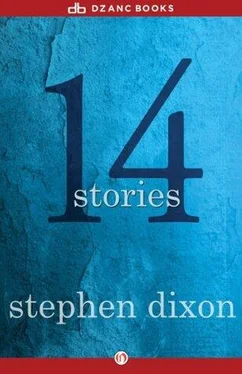Stephen Dixon - 14 Stories
Здесь есть возможность читать онлайн «Stephen Dixon - 14 Stories» весь текст электронной книги совершенно бесплатно (целиком полную версию без сокращений). В некоторых случаях можно слушать аудио, скачать через торрент в формате fb2 и присутствует краткое содержание. Год выпуска: 2013, Издательство: Dzanc Books, Жанр: Современная проза, на английском языке. Описание произведения, (предисловие) а так же отзывы посетителей доступны на портале библиотеки ЛибКат.
- Название:14 Stories
- Автор:
- Издательство:Dzanc Books
- Жанр:
- Год:2013
- ISBN:нет данных
- Рейтинг книги:5 / 5. Голосов: 1
-
Избранное:Добавить в избранное
- Отзывы:
-
Ваша оценка:
- 100
- 1
- 2
- 3
- 4
- 5
14 Stories: краткое содержание, описание и аннотация
Предлагаем к чтению аннотацию, описание, краткое содержание или предисловие (зависит от того, что написал сам автор книги «14 Stories»). Если вы не нашли необходимую информацию о книге — напишите в комментариях, мы постараемся отыскать её.
14 Stories — читать онлайн бесплатно полную книгу (весь текст) целиком
Ниже представлен текст книги, разбитый по страницам. Система сохранения места последней прочитанной страницы, позволяет с удобством читать онлайн бесплатно книгу «14 Stories», без необходимости каждый раз заново искать на чём Вы остановились. Поставьте закладку, и сможете в любой момент перейти на страницу, на которой закончили чтение.
Интервал:
Закладка:
“No you’re not. You were running after them before.”
“I was running after them because I saw the man chasing the woman, and I thought something was wrong.”
“Something was,” a man says.
“What happened?” I say.
“You’re the one running after them, and all of a sudden you didn’t see?” a woman says.
“No.”
“Like hell you didn’t.”
I decide to help the knifed man first. At least I can find out quick enough if he’s dead or not. If he’s alive then there can’t be much I can do for him except put a support under his head, and then I can go right to the woman or other man.
“Will someone please do what they can to make the woman and that man comfortable while I see to this one?”
“Best medicine and treatment in these situations is to wait for professional help,” a man says. “Real doctors or hospital aides, but someone ignorant of medicine can do more damage than someone not doing anything.”
“He’s right,” several people say in different ways.
“But I know what I’m doing. I’m not in the field of medicine, but I know how to stop someone from bleeding to death.”
“How?” a man says.
“Tourniquets, for one thing.”
“That’s for arms and legs, not the head.”
“I said ‘for one thing.’ Another way is pressure points. The neck. There’s one there. They’re all over the body. Or you stick your finger on the wound or in the blood vessel that’s cut if you can’t find the right pressure point. At least let me try.”
“Sure, we can let you try, and watch you finish off all three of them before our eyes. Just stay off them.”
“I’m sorry, but I still think it’s best I try.” I feel the woman’s forehead. Put my ear next to her mouth. “She’s breathing.”
“We said stay off her,” the man says. “Wait for help.”
“What I think is someone else ought to call the police for help. That girl might have met a friend or someone and just forgotten about it.”
“She’s a good trustful girl,” the woman who said she knows the girl’s mother says.
“I’m not saying she’s bad or distrustful. But younger people — particularly around her age, eight or nine or so — do get distracted more than adults.”
“She’s ten,” the woman says.
“Ten-year-olds probably get less distracted than eight- or nine- year-olds, but still get distracted a lot.”
“So do adults,” a woman says.
“I know. But children more so.”
“Children more so. You’re right. Maybe someone ought to go as he says. You go, why don’t you?” she says to me. “You seem so interested and reliable.”
“I want to stay here and help these people now.”
“I think you’d best be giving help by phoning for it than touching them,” a man says. “And out of all of us, you’re the one who seems more liable to do the most trouble if you stay.”
“I agree,” a woman says.
“I don’t.” I feel the stabbed man’s temple. “He’s alive.”
“Too bad,” a man says.
“What are you saying?” someone else says.
“What I said. Too bad he’s alive. He started it, didn’t he?”
“No, the other man did.”
“It was a woman,” a woman says. “She stole something from the man with the knife in him. That’s why he chased her. The other man just happened to step in. And she took the knife out of his hand, which he only pulled out to protect her, and put it in the stabbed man’s chest.”
“I think the woman and the man holding his stomach did know one another,” I say.
“You know them?”
“I saw them together. They were standing on the corner of this same avenue three blocks away. The man went into a corner store, and the woman waited for him outside.”
“What kind of store?”
“I forget. A jewelry store. I was waiting for my bus. Then the man came out and held the package out for her, or just held it out without any intention of giving it to her. Anyway, she took it and put it in her pocketbook and ran. The man walked after her. She ran faster. He started jogging and then ran after her. She at first ran faster than him when they were both running, and then, because she was tired or her pocketbook had become too cumbersome to run with or something, she slowed down and he caught up. Right here. I was standing over there. Next to the hydrant. The one where the two dogs are.”
I’m still on one knee and now pointing through someone’s legs. Almost all of them turn to look at the hydrant and dogs. “Then the man took the pocketbook from her, and she tried getting it back. He pushed her and she slapped him. Rather, he hit her hand and she slapped his face and he punched her and she went down. That’s when the man who was knifed stepped in for the second time. Most of you must have seen that. The first time he stepped in he was told to mind his own business and he did. This time I don’t remember him being told anything. They just argued. And he pulled out a knife — the knifed man did — after the other man hit him in the face with the pocketbook. Then the other man must have taken the knife away from him and stabbed him with it, though I’m only assuming now, since that’s when you all suddenly encircled them and I couldn’t see what happened.”
“That’s not at all what happened,” someone says.
“Then what really happened?” someone says.
“You didn’t see it?”
“I just got here.”
“Remember that little girl who went to phone the police?”
“I told you, I just got here.”
“Well, there was a little girl of about nine or ten or so who we sent to call for help.”
“Ten,” a woman says.
“Ten. Well, she knifed him.”
“Don’t be ridiculous,” several people say in different ways.
“I thought we needed a bit of, I don’t know, levity here, what with the grim sight of them lying there and waiting for help taking so long. But I guess it was in bad taste.”
“Very.”
While they were saying all this I took my jacket off, rolled it up and put it under the woman’s head.
“Here it comes,” a man says.
We hear an ambulance siren and look in the street. The ambulance and police escort preceding it pass.
“Must be for someone else.”
“I really think one of us should try and get the police now,” I say. “Just to remind them, if the girl called, or to let them know, if she didn’t.”
“Maybe he’s got a point,” the woman who said she trusts the girl says.
“I’ll go,” I say.
“You’ve already done enough damage,” a man says.
“What do you mean? You wouldn’t let me do anything, which is why I’m volunteering to go.”
“You picked up that woman’s head just before. Maybe they didn’t see you, but I did. And in her condition you might have done just enough damage to kill her, when if you hadn’t touched her she might have been saved.”
“You don’t know that.”
“I say we make sure he stays here and we send someone else to call.”
“Send anyone you want, but I’m also phoning for help.” I push through the crowd. I look back. The circle’s together again around the three injured people. I go into one of the stores nearest the crowd and ask the hardware-store man if I can use his phone.
“There’s a public booth a block north of here,” he says.
“I haven’t a dime and this is an emergency.”
“All I get every day are people with no dimes and life-and-death emergencies.”
“Let him use the phone,” a woman at the cash register says.
“I said no.”
“But it’s real important. Can’t you look outside yourself and see?”
“Just keep looking for your register-tape error and don’t butt in.”
Читать дальшеИнтервал:
Закладка:
Похожие книги на «14 Stories»
Представляем Вашему вниманию похожие книги на «14 Stories» списком для выбора. Мы отобрали схожую по названию и смыслу литературу в надежде предоставить читателям больше вариантов отыскать новые, интересные, ещё непрочитанные произведения.
Обсуждение, отзывы о книге «14 Stories» и просто собственные мнения читателей. Оставьте ваши комментарии, напишите, что Вы думаете о произведении, его смысле или главных героях. Укажите что конкретно понравилось, а что нет, и почему Вы так считаете.












